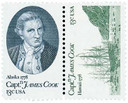
U.S. #1732-33
1978 13¢ Captain Cook
Set of 2
Issue Date: January 20, 1978
City: Honolulu, HI
Quantity: 101,077,500
Printed By: Bureau of Engraving and Printing
Printing Method: Giori press
Perforations: 11
Color: Dark blue (#1732) and green (#1733)
This two stamp se-tenant issue marks the 200th anniversary of Captain James Cook’s visits to Hawaii and Alaska in 1778. This issue is unique in that one of the stamps was printed vertically and the other printed horizontally.
Birth Of Explorer James Cook
British explorer and navigator Captain James Cook was born on November 7, 1728 (October 27 in the Old Style calendar), in Marton, Yorkshire, England.
Cook attended school for five years before leaving to work with his father on a farm. At age 16, Cook found a job as a shop boy in a fishing village. He soon realized he wasn’t suited to this work, but instead, was drawn to the sea.
Cook traveled to the nearby port town of Whitby and got an apprenticeship with the merchant navy. This gave him experience at sea and the chance to study mathematics, navigation, and astronomy, all of which would help him later in his career as a navigator.
Cook completed his apprenticeship and was offered command of his own vessel, but instead joined the British Navy, where he would have better opportunities for advancement. At the time, the French and Indian war was raging in North America. In 1759, Cook conducted a dangerous mission, entering French territory in Canada to survey the Saint Lawrence River for the navy. His accurate charts enabled the British to capture the city of Quebec later that year, a key turning point in the war.
During the war, Cook had spent five years in Newfoundland, producing some of the first and most accurate large-scale maps of the island’s coasts. His detailed work caught the attention of the Admiralty and the Royal Society. The Admiralty then commissioned Cook with conducting a scientific voyage to the Pacific Ocean. Cook resolved that he would not just “go farther than anyone had gone before but as far as possible for a man to go.”
Cook’s first voyage, which lasted from 1768 to 1771, was a scientific trip, intended to study the transit of Venus across the Sun. That study, in addition to other observations, would be used to measure the Earth’s distance from the Sun. Unfortunately, these observations didn’t turn out to be as accurate as hoped. Cook also had a second mission on this voyage – to search the south Pacific for Terra Australis. On his journey, Cook mapped the Polynesian Islands and became the first European to explore the eastern coastline of Australia in 1770, claiming a large area for England.
Cook embarked on his second voyage from 1772 to 1775. Once again he was tasked with searching for the fabled Terra Australis. This expedition became one of the first to cross the Antarctic Circle. He also made stops in the Friendly Islands, Easter Island, Norfolk Island, New Caledonia, Vanuatu, and what would become the Cook Islands. He also discovered the South Sandwich Islands. The maps and journals from this voyage helped to bring an end to the myth of Terra Australis.
Upon returning to England, Cook was promoted to post-captain and given an honorary retirement from the Royal Navy. He was made a Fellow of the Royal Society and received the Copley Gold Medal. Cook then volunteered for a third voyage (1776-79) to search for the Northwest Passage – a way to sail from the northern Atlantic Ocean to the northern Pacific Ocean.
During that expedition, Cook and his crew became the first Europeans to set foot in the Hawaiian Islands on January 18, 1778. Cook named Hawaii the “Sandwich Islands,” after the British chief naval minister, the Earl of Sandwich. The Hawaiians believed Cook had divine powers and considered him a great chief. After engaging in friendly trade, Cook left the islands after two weeks.
Cook then sailed north and explored Alaska. His voyage there added an enormous amount of information to the blank spots on the maps of the northern coast. However, large walls of ice forced Cook to leave the area and he returned to Hawaii in November 1778.
Cook’s arrival in Hawaii coincided with an important festival. Many historians speculate that the islanders believed Cook was fulfilling a Hawaiian legend – the return of their “sea god,” Lono. Regardless, the Europeans were welcomed with great hospitality. However, friction soon developed between the crew and the islanders.
The poor condition of Cook’s ships prevented him from leaving. In February 1779, a Hawaiian stole one of his boats. While Cook was investigating the theft, a fight broke out between the Hawaiians and Cook’s crew. Cook was stabbed to death during a fight on February 14, 1779.
Cook was respected so greatly that, among many other honors, Russia named an island group near New Zealand after him (the Cook Islands). Perhaps the greatest praise came from Benjamin Franklin. As the American Colonies battled Great Britain for independence in the Revolutionary War, battles were often fought at sea. Any ship of the opposing nation was potential prey – with one exception.
In 1779, Franklin ordered that American ships should “…not consider (Cook’s ship) an enemy, nor suffer any plunder to be made of the effects contained in her, nor obstruct her immediate return to England…but that you treat the said Captain Cook and his people with all civility and kindness… as common friends to mankind.” But at the time of the order, Cook had already been slain in Hawaii.
Click here to visit the website of the Captain Cook Society, which has a wealth of information on Cook’s life and voyages.









